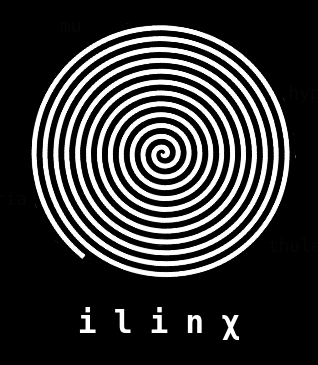Ilinx
Ilinx is an hypertextual browser-based explorable space. Its matrix consists in a patchwork of electronic literature symbiontically (co)existing in a continuum where different projects and texts on the relation between language and representation, reality and fiction, humans and computers, are intertwined through the lens of subjective experience (or phenomenal consciousness). Beyond the surface, Ilinx is a quest to develop a platform connecting the paths of my personal epistemological and existential research. Its result, at this point in time, consists in a conception of software as an out-of-hardware experience, projecting the self into an hyperstitional spazio-temporal oecumene where new worlds can be designed and inhabited augmenting self-consciousness and affecting reality.
Exercises in Ilinx self-definition
"[Ilinx is [a game]] based on the pursuit of vertigo and which consist of an attempt to momentarily destroy the stability of perception and inflict a kind of voluptuous panic upon an otherwise lucid mind. In all cases, it is a question of surrendering to a kind of spasm, seizure, or shock which destroys reality with sovereign brusqueness." - Roger Caillois, 'Man, Play and Games' (1958)
The projects and texts that will become the nodes of ilinx's language maze, expands beyond the browser into the layers of code (HTML, CSS, JS), and are interwoven through quasi-consistent pieces of narrative, fragments of different stories spanning between history and myth, theory and fiction, fantasy and science-fiction, following the definition of ilinx developed by Roger Callois.
ȶɦɛ ƈօռƈɛքȶ օʄ ʟǟռɢʊǟɢɛ ʍǟʐɛ ɖɛʋɛʟօքɛɖ ɨռ ʍʏ ȶɦɛֆɨֆ, ǟռɖ ʀɛʄɛʀʀɨռɢ ȶօ ɢɨօʀɢɨօ ƈօʟʟɨ ʀɛֆɛǟʀƈɦ օռ ȶɦɛ օʀɨɢɨռ օʄ քɦɨʟօֆօքɦʏ ɨռ ȶɦɛ ʍʏȶɦ օʄ ȶɦɛ ʟǟɮʏʀɨռȶɦ, ɮɛƈօʍɛֆ ȶɦɛ ʄʊռɖǟʍɛռȶǟʟ ֆȶʀʊƈȶʊʀɛ ǟռɖ ɨȶֆ ʀɛʟǟȶɨօռ ȶօ ȶɦɛ ʊֆɛʀֆ ɛӼքʟօʀɨռɢ ɨʟɨռӼ, ɨȶֆ ȶɦɛօʀɛȶɨƈǟʟ ƈօռƈʟʊֆɨօռ.
" ǟ "ʟǟռɢʊǟɢɛ ʍǟʐɛ" ʍǟɖɛ օʄ ʋɛʀɮǟʟ ǟռɖ ռօռ-ʋɛʀɮǟʟ ʟǟռɢʊǟɢɛֆ, ռǟȶʊʀǟʟ ʟǟռɢʊǟɢɛֆ ǟռɖ ʄօʀʍǟʟ ʟǟռɢʊǟɢɛֆ, ƈօʍքʊȶɛʀ'ֆ ƈօɖɛ ǟռɖ ʍǟƈɦɨռɛ ʟǟռɢʊǟɢɛֆ. ǟ ɖɛǟɖǟʟʊֆ' ʟǟɮʏʀɨռȶɦ օʄ ʍǟȶɛʀɨǟʟ, ɨռʄօʀʍǟȶɨօռǟʟ, ǟʟɢօʀɨȶɦʍɨƈ ǟռɖ ʟɨȶɛʀǟʀʏ ɛӼքʟօʀǟɮʟɛ ֆքǟƈɛֆ ɖɛʋɛʟօքɨռɢ ɨռ ȶɦɛ ɦօʀɨʐօռȶǟʟ ǟռɖ ȶɦɛ ʋɛʀȶɨƈǟʟ ɖɨʀɛƈȶɨօռ, ʄʀօʍ ʍɨƈʀօֆƈօքɨƈ ȶօ ʍǟƈʀօֆƈօքɨƈ ȶɛʀʀɨȶօʀɨɛֆ, ɨռȶɛʀռǟʟ ɛӼȶɛʀռǟʟ ǟռɖ ɨռȶɛʀռǟʟ ֆքɦɛʀɛֆ. ǟ քɛռɛʟօքɛ'ֆ աɛɮ ʍǟɖɛ օʄ ʀօօʍֆ ȶɦǟȶ, ǟֆ ɛֆƈɦɛʀɨǟռ քǟɨռȶɨռɢֆ, ɦɨɖɛֆ ʀɛƈʊʀֆɨʋɛ ֆɨʍʊʟǟȶɨօռֆ ǟռɖ ɛʍʊʟǟȶɨօռֆ օʄ օȶɦɛʀ ʀօօʍֆ, օȶɦɛʀ ʍǟʐɛֆ ǟռɖ ɨȶֆɛʟʄ. քɛʀɦǟքֆ, աɦǟȶ ɖɨֆȶɨռɢʊɨֆɦɛֆ ȶɦɛ ɦʊʍǟռ ʄʀօʍ ȶɦɛ ʍǟƈɦɨռɨƈ, ɨֆ ȶɦɛ ʄɛɛʟɨռɢ, ɨʟʟʊֆօʀʏ օʀ ʀɛǟʟ, օʄ ɮɛɨռɢ աɦօʟɛ աɨȶɦ ȶɦɛ "ʟǟռɢʊǟɢɛ ʍǟʐɛ" ǟֆ ǟռ ɨռʄɨռɨȶɛ ֆքǟƈɛ (ʟօɢօֆ) աɦɛʀɛ ȶօ ɮʊɨʟɖ ռɛա աօʀʟɖֆ ʄʀօʍ ֆƈʀǟȶƈɦ." - օʊȶɨֆ
"ȶɦɛ ʟǟɮʏʀɨռȶɦ ɨֆ քʀɛֆɛռȶɛɖ, ȶɦɛռ, ǟֆ ǟ ɦʊʍǟռ ƈʀɛǟȶɨօռ, ǟ ƈʀɛǟȶɨօռ օʄ ȶɦɛ ǟʀȶɨֆȶ ǟռɖ օʄ ȶɦɛ ɨռʋɛռȶօʀ, օʄ ȶɦɛ ʍǟռ օʄ ӄռօաʟɛɖɢɛ, օʄ ȶɦɛ ǟքօʟʟօռɨǟռ ɨռɖɨʋɨɖʊǟʟ, ʏɛȶ ɨռ ȶɦɛ ֆɛʀʋɨƈɛ օʄ ɖɨօռʏֆʊֆ ȶɦɛ ǟռɨʍǟʟ-ɢօɖ." - ɢɨօʀɢɨօ ƈօʟʟɨ, 'ȶɦɛ ɮɨʀȶɦ օʄ քɦɨʟօֆօքɦʏ' (1975)
- Lemuria
- Thule
- Mu
- Hyperborea
- Myst
- Colossal Cave Adventure / Zorg
- Rouge-like games
- ELIZA
- Clippy
© N̴̘͋̓͘a̴̞͓̎́̒͆͌͗̑̓͒͠ṯ̵̣̺̫͈̲̗̲̃̈́͋͐͌̆̑̾̂û̷̢̬͈͈̰͗̓̀̈́͋͝ṙ̵̟̫͔͈̈́͗͛͘̕a̶̗̭̫̥̝͈̗̹̿̏̏̏͆̀͝͠ļ̴̛̹̘̲̠͍͚̰̀́̑̓̒̇̌̌ͅ-̴̺̫̤͙̹͔̅͛̔̂͆͆͠ͅB̸̖̖͙̳̝̬̒́̅̓̊̉͝ͅo̷̥̤̻͕̘̹̞̍r̷͔̤͕̮̰̓̓̃͒͌͘͘̚͝ͅn̶̢͋̀̀͝ ̸̼̬͆̋͋͂̀͑͘̚͝Í̸̯̼̌͑̏n̸̡̞̮̩̥̣̙̼̗̿f̸̘̺̝̪̼̥͙̩̟͝ȩ̴̨̝͖͖̏͋ç̴̨͕̰͔̥̲͎̺̦͆̽̓̃̐̓͝ṱ̵̛̩͓͕̦̮̈́̍̏̒̓̉͗̚͘ͅe̵̬̒̑̂̋̾̾̑̇̕͠d̴̨̘̼̣͊͌͛͌̂͗͝͠͝

